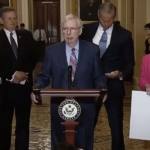The purpose of this column is to make the reader aware of current events in politics and media and to explain the facts from both sides to get a real picture of the argument instead of having message skewed through mainstream media. This is one man trying to relate to college students the hot issues of the world so as to make the information for accessible. The column will present an opinion but will do the it’s best to only use opinions supported by lines of evidence.

Patrick Olds
– Opinions Editor –
The line between necessity and luxury has been badly smeared in regard to the national budget debate.
For the first time in more than 30 years last year, the U.S. House did not pass a budget for fiscal year 2012.
That places a great burden on the current members of Congress. Recently, a two-week extension was passed to extend the debate.
What’s the biggest sticking point? It’s knowing what to cut and what not to cut in spending that is the holdup.
The United States has national debt of more than $14 trillion. Most people can’t even visualize what a billion dollars look like. Try to wrap one’s mind around $14 trillion.
The newly-elected House of Representatives is lead by a Republican majority that wants to cut just more than $60 billion.
Democrats are proposing a $10.5 billion cut. Both cuts are from a previous $3.7 trillion budget. For a visual, a $10.5 billion cut represents less than one-third of 1 percent of the national budget.
If we are taking an honest look at reducing the national budget, $10.5 billion will not cut it. The proposed $60 billion seems like a drop in the bucket. It’s a matter of whether everyone that represents us is taking us seriously.
When Democrats find fault with cutting a bloated education budget that has not improved with an influx of dollars throughout the past 20 years, then what should be cut?
How many people know that the House of Representatives is trying to pass a requirement that all government agencies publish the programs for which they request money? Currently, only the Department of Education does so. Why are we allowing blank checks for government agencies that have proven time and time again that they are mostly incompetent when handling taxpayer funds?
The real problem is the recognition of a clear difference between necessity and luxury.
Our debt crisis is not just an inconvenience; it is a crisis.
It is the liberals’ mindset that we are not broke, as Michael Moore said, but that the rich people have the money and are not sharing.
Moore said this while suing from profits for some of his films.
If this debt meets reality in the future, will we look back and say, ‘Could we have cut this or that?’ I feel like we will say that programs which are proposed to be cut will be immaterial to us.
It really depends on whether the politicians feel the debt is a real threat to our future security and standard of living.
These cuts in discretionary spending seem futile, but reductions have to start somewhere, and we cannot afford not to cut programs because we enjoy the luxury.
Recently elected Sen. Joe Manchin of West Virgnia recently said President Obama is ”the most powerful person” when it comes to avoiding a government shutdown over the budget, and that he “has failed to lead this debate or offer a serious proposal for spending and cuts.”
Is Washington willing to make the difficult cuts in the future toward entitlement programs? That’s where the real money is. It has to start somewhere.










